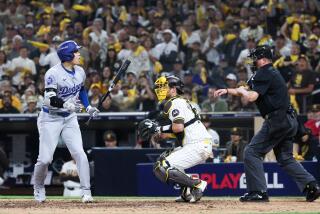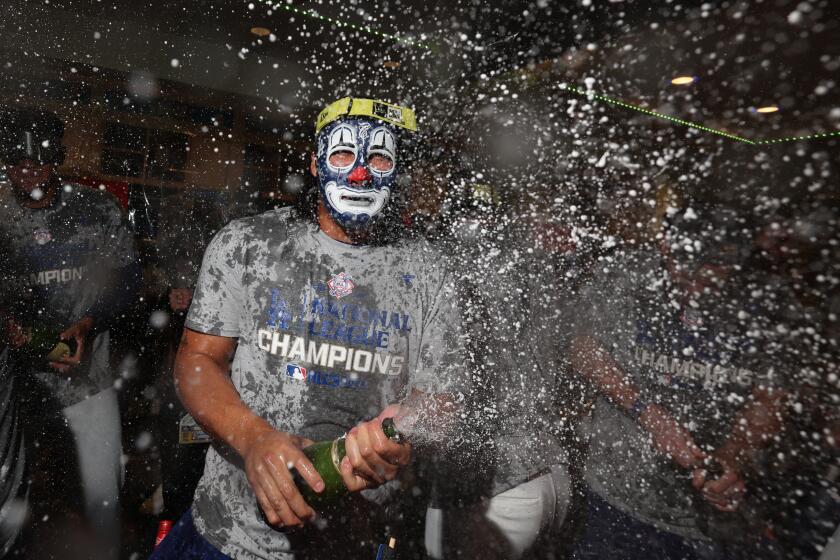This contract was never a good buy, so good riddance
After two years of floating transparently through Chavez Ravine summers, J.D. Ghost has finally done something with passion, with strength, with heart.
He quit.
He ordered his agent to tell the Dodgers on Thursday that he was opting out of a contract that was undeservedly lucrative and generously long.
He walked away from a stunningly guaranteed $33 million because it wasn’t enough.
He walked away from a team that spent two years coddling and protecting him because a supportive clubhouse wasn’t enough.
He walked away from a city that blindly embraced and supported him because Dodgers fans weren’t enough.
He did all of this only a few weeks after publicly saying he wasn’t going anywhere, because his word wasn’t enough.
In a flourish never before seen from the softest player on the planet, J.D. Drew flat quit.
The move was legal, fair, Scott Boras-brilliant, and stunningly brash.
Who knew the Ghost had it in him?
“He wants out. He can have out,” said Ned Colletti, Dodgers general manager. “If he’s moving on, we’re moving on.”
Boras, Drew’s agent, was surprised at Colletti’s anger, saying this was just business.
“I never said anything like that when he didn’t exercise the option on Eric Gagne, it works both ways,” Boras said.
I’ll confess, I’m having a hard time writing this while doing a butter-churn dance, high-fiving strangers and digging up Christmas music.
Losing J.D. Drew is the best thing to happen to the Dodgers since they lost Milton Bradley.
His disappearing act was as disruptive as Bradley’s disturbances.
Keeping him in the lineup was as difficult as keeping Bradley out of trouble.
Sure, he led the team with 100 runs batted in last season, but do you remember more than a handful of them? In two years he averaged 109 games, 18 homers, 68 RBIs and dozens of funny looks from teammates who never quite understood.
He missed games with strange pains and hidden soreness. He missed games simply because the manager didn’t want to push him. Never once did he express anger that he wasn’t in the lineup, even in the final week of this season’s playoff push. Never once, it seemed, did he fight to get on the field.
The Dodgers will not miss a presence they never had, a power they never felt.
They can take the $33 million that he just dropped in their pockets -- $11 million annually -- and use it to get stronger and tougher and better.
A couple of days from now, Colletti will realize that giving up the Ghost is the best thing that could have happened.
But he’s angry now because the Dodgers did back flips to keep this guy happy. He’s angry because the Dodgers were caught by surprise. He’s angry because if he had known this earlier, he could have planned better for an off-season that will now be as nuts as last winter.
“You don’t just go to the Rotisserie room basement and pull another guy off the table,” Colletti said.
So the question remains, why did he leave? He didn’t return The Times’ phone calls Thursday night, so we’ll have to guess.
Everyone, including Drew, thought he was happy here. Late in the season, he told the Orange County Register’s Bill Plunkett he was staying.
“At some point, you make those commitments, and you stick to them,” he told Plunkett.
Colletti referred to that story with a sigh.
“I’m surprised how it came down,” he said. “Everything that we had heard ... indicated that the player loved being here.”
Boras publicly agreed with that.
“There’s no question he was happy in L.A.,” he said.
So was it all about the money?
Considering Drew instantly becomes the third-most attractive free-agent outfielder for teams that will gladly ignore his issues, much of it is.
“If you have a five-tool outfielder who drove in 100 runs in a rather weak center-field free agency market, that matters,” Boras said.
But apparently it was also about the warm fuzzies. Insiders are saying that Drew truly did it love it here, until the season ended and he realized that not everyone in the organization loved him.
He heard the rumblings that the front office was tired of the coddling. He grew weary of media that kept applying the heat.
Drew is the sort of player who hates the hassles that come with being a star. He wanted to go somewhere and do what he does best -- disappear.
By the end of the season, he apparently realized that the longer he was here, the more impossible this disappearing act would become.
Increasingly, the Dodgers weren’t afraid of no Ghost.
So Drew climbed on Boras’ back and took the leap, while Colletti rubbed his eyes in shock that such a mild player could act so maddeningly.
In the end, there’s no reason for anger by anyone. Drew was just exercising his rights. Boras is just doing his job. The Dodgers eventually will get what they want. None of this was illegal or unethical.
If you want to be upset, be upset at former general manager Paul DePodesta for giving Drew such a misguided quit clause in the first place.
On second thought, give DePodesta a standing ovation.
The Dodgers have finally rid themselves of ... what’s his name again?
Bill Plaschke can be reached at bill.plaschke@latimes.com. To read previous columns by Plaschke, go to latimes.com/plaschke.
More to Read
Are you a true-blue fan?
Get our Dodgers Dugout newsletter for insights, news and much more.
You may occasionally receive promotional content from the Los Angeles Times.











